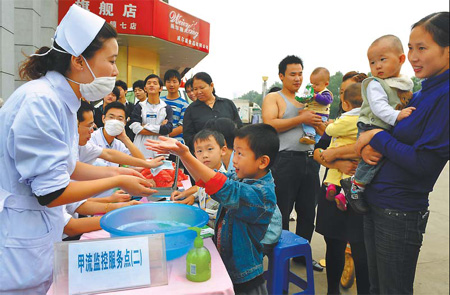Students have become the major target of China's surging A/H1N1 flu.
The virus has caused many clusters of outbreaks this autumn and is expected to infect tens of millions nationwide, local statistics show.
 |
|
Medical staff teach kids how to wash hands in the correct way in the Bailuzhou community in the city's economic development zone of Lu'an, East China's Anhui Province, yesterday. [China Daily] |
According to the latest A/H1N1 report issued by Guangdong Province, students account for 70 percent of its reported cases.
Nine schools in the provincial capital of Guangzhou have suspended classes due to confirmed A/H1N1 cases since the new term started on Sept 1.
In Tianjin, 32 students from five schools were infected recently, the municipal health bureau said on Saturday. Until then, there had been only 68 A/H1N1 cases in the city.
Similar situations were reported around the country.
In Beijing, more than 2,000 students from two middle schools were told to stay at home for one week because of confirmed cases, while in Xinjiang, eight of the nine patients confirmed on Saturday were students of middle and primary schools.
Health Minister Chen Zhu warned earlier this month that China faced a grim situation containing A/H1N1 as schools start again and the number of cases rise.
A senior official at the ministry predicted that A/H1N1 flu would hit a peak in the autumn-winter period and infect tens of millions of people across the country.
China has reported more than 11,700 cases of A/H1N1 flu, of whom more than 7,200 people have recovered. So far there have been no deaths reported.
To ease the situation, the Ministry of Health announced that students and teachers of primary and middle schools will be among the first batch of people, 5 percent of China's 1.3 billion population, to receive a free vaccine by year-end.
The Ministry of Education also promised earlier this month that students nationwide would soon get free preventive traditional Chinese medicines in schools.
Local schools have also moved to fight the flu. Students in Sichuan University, for example, have received free surgical masks, thermometers and traditional Chinese medicine, while the canteens have stopped serving raw or cold food, which is believed to increase the risk of infection.
Police on guard
The Ministry of Public Security on Friday warned police to be on guard against any threats to public order linked to the spread of the A/H1N1 strain of flu, including the spreading of rumors and price-gouging for drugs.
"The Ministry of Public Security ... demands all security organizations pay great attention to the possible effects on social stability from the virus," it said on its website.
"Strike hard against rumormongers, the sale and production of fake, shoddy drugs and equipment, and the driving up of medicine prices," it added in a statement.
"Prevent the spread of the virus from disturbing the normal social order and anything which may affect the smooth progress of celebrations for the 60th anniversary of the founding of new China."
The capital Beijing is already under tightened security ahead of the Oct 1 anniversary.
(China Daily September 21, 2009)